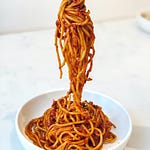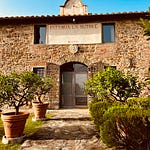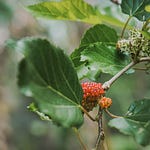In this episode I share:
The one food that I don’t miss from Tuscan cuisine (…it’s bread!)
A legend that might trace back its origin
What 14th centuries authors wrote about it
Ways I used to enjoy it growing up in Tuscany
Full transcript :
The one thing that I don’t miss from Tuscan cuisine is unsalted bread.
Florentines take great pride in their pane toscano, made from only flour, sourdough starter, and water. It’s a rustic round loaf, typically weighing one to two kilograms, baked in a wood-fired oven. Inside the brown crust is a white, slightly acidic center, thanks to the sourdough. This bread is a staple of Tuscan cuisine.
In Florence, it’s known as pane sciocco—unsalted bread. Interestingly, the term sciocco can also mean foolish when referring to a person, because people believed salt made you smart. There’s a hint of this same idea in English, in the expression "take it with a grain of salt”, meaning, be skeptical and use your judgment.
The tradition of Florentine unsalted bread dates back to the 13th century. While its origins remain somewhat mysterious, a legend says that during this period, the powerful maritime republic of Pisa, with its bustling port, raised the price of salt. Salt was then known as"white gold." It was crucial for preserving meat and fish, and was used for disinfection and dehydration. Florence refused to pay the higher price, and so had no choice but to make bread without salt.
We know that Florentine bread was unsalted at that time from the work of the renowned Florentine writer Dante Alighieri, often considered the father of the Italian language. In his masterpiece, "The Divine Comedy," Dante encounters his ancestor Cacciaguida, who warns him about the hardship and alienation he will experience during his exile from Florence. Cacciaguida tells Dante, "tu proverai come sa di sale lo pane altrui," which translates to "you will know how salty others' bread tastes." And, in real life, Dante was exiled from Florence and had to endure salted bread for the rest of his life.
Another major Florentine writer of the 14th century, Boccaccio, defines bread as the perfect "temperate" food, embodying a medieval belief that bread maintained the perfect balance between hot (baked in wood-fired ovens), cold (uncooked dough), moist (water), and dry (flour). And salt had no part in this perfect balance!
I've now lived abroad for a decade and have learned to love salted bread, but my childhood is filled with fond memories of unsalted bread.
I used to take merenda—the afternoon snack—very seriously, like every Italian child. My grandmother would serve me a slice of Tuscan bread with a square of dark chocolate. During the summer, my mother would prepare pane con il pomodoro strusciato, a slice of bread rubbed with fresh tomato to release its juices, sprinkled with dried oregano, and drizzled with olive oil. It was so good!
Another unforgettable merenda is from summer camp in Chianti, when I spent a week at a farmhouse with a group of kids. In the late afternoon, the adults would serve bread with butter and anchovy spread. I know that not everybody likes anchovies, but for me, there is nothing more delicious than the combination sweet butter with the of the anchovies!
Whether you like your bread salted or unsalted, it’s fascinating to unpack the stories hidden in Tuscan loaves.
If you have been to Tuscany, what was the food that you absolutely didn’t like it?















The one thing I don't miss of Tuscan cuisine